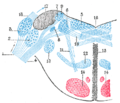Superior vestibular nucleus
(Redirected from Nucleus of Bechterew)
| General Information | |
|---|---|
| Latin | nucleus vestibularis superior |
| Greek | |
| TA98 | |
| TA2 | |
| FMA | |
| Details | |
| System | Vestibular system |
| Artery | Anterior inferior cerebellar artery |
| Vein | |
| Nerve | Vestibulocochlear nerve |
| Lymphatic drainage | |
| Precursor | |
| Function | |
| Identifiers | |
| Clinical significance | |
| Notes | |
The superior vestibular nucleus is one of the four major vestibular nuclei located in the brainstem. It plays a crucial role in the processing of vestibular information and is involved in the coordination of eye movements and posture.
Anatomy
The superior vestibular nucleus is situated in the pons, a part of the brainstem. It is located dorsally to the medial vestibular nucleus and is adjacent to the lateral vestibular nucleus. The superior vestibular nucleus is part of the vestibular nuclear complex, which also includes the inferior vestibular nucleus.
Connections
The superior vestibular nucleus receives input from the semicircular canals of the inner ear via the vestibular nerve, a branch of the vestibulocochlear nerve (CN VIII). It also receives input from the cerebellum, particularly the flocculonodular lobe, which is involved in the integration of vestibular information.
The superior vestibular nucleus sends efferent projections to several key areas:
- The oculomotor nucleus and trochlear nucleus, which are involved in the control of eye movements.
- The thalamus, which relays vestibular information to the cerebral cortex.
- The spinal cord, where it influences postural reflexes.
Function
The primary function of the superior vestibular nucleus is to process and integrate sensory information from the vestibular apparatus. This information is crucial for maintaining balance, spatial orientation, and gaze stabilization.
Gaze Stabilization
The superior vestibular nucleus is involved in the vestibulo-ocular reflex (VOR), which stabilizes vision during head movements by producing compensatory eye movements. This reflex is essential for clear vision while the head is in motion.
Postural Control
Through its connections with the spinal cord, the superior vestibular nucleus helps regulate muscle tone and posture, allowing the body to maintain balance and equilibrium.
Clinical Significance
Dysfunction of the superior vestibular nucleus can lead to a variety of clinical symptoms, including vertigo, nystagmus, and balance disorders. Lesions affecting this nucleus may result from stroke, multiple sclerosis, or other neurological conditions.
See Also
| Anatomy and morphology | ||||||||||
|---|---|---|---|---|---|---|---|---|---|---|
|
Superior vestibular nucleus
Transform your life with W8MD's budget GLP-1 injections from $125.
W8MD offers a medical weight loss program to lose weight in Philadelphia. Our physician-supervised medical weight loss provides:
- Most insurances accepted or discounted self-pay rates. We will obtain insurance prior authorizations if needed.
- Generic GLP1 weight loss injections from $125 for the starting dose.
- Also offer prescription weight loss medications including Phentermine, Qsymia, Diethylpropion, Contrave etc.
NYC weight loss doctor appointments
Start your NYC weight loss journey today at our NYC medical weight loss and Philadelphia medical weight loss clinics.
- Call 718-946-5500 to lose weight in NYC or for medical weight loss in Philadelphia 215-676-2334.
- Tags:NYC medical weight loss, Philadelphia lose weight Zepbound NYC, Budget GLP1 weight loss injections, Wegovy Philadelphia, Wegovy NYC, Philadelphia medical weight loss, Brookly weight loss and Wegovy NYC
|
WikiMD's Wellness Encyclopedia |
| Let Food Be Thy Medicine Medicine Thy Food - Hippocrates |
Medical Disclaimer: WikiMD is not a substitute for professional medical advice. The information on WikiMD is provided as an information resource only, may be incorrect, outdated or misleading, and is not to be used or relied on for any diagnostic or treatment purposes. Please consult your health care provider before making any healthcare decisions or for guidance about a specific medical condition. WikiMD expressly disclaims responsibility, and shall have no liability, for any damages, loss, injury, or liability whatsoever suffered as a result of your reliance on the information contained in this site. By visiting this site you agree to the foregoing terms and conditions, which may from time to time be changed or supplemented by WikiMD. If you do not agree to the foregoing terms and conditions, you should not enter or use this site. See full disclaimer.
Credits:Most images are courtesy of Wikimedia commons, and templates, categories Wikipedia, licensed under CC BY SA or similar.
Translate this page: - East Asian
中文,
日本,
한국어,
South Asian
हिन्दी,
தமிழ்,
తెలుగు,
Urdu,
ಕನ್ನಡ,
Southeast Asian
Indonesian,
Vietnamese,
Thai,
မြန်မာဘာသာ,
বাংলা
European
español,
Deutsch,
français,
Greek,
português do Brasil,
polski,
română,
русский,
Nederlands,
norsk,
svenska,
suomi,
Italian
Middle Eastern & African
عربى,
Turkish,
Persian,
Hebrew,
Afrikaans,
isiZulu,
Kiswahili,
Other
Bulgarian,
Hungarian,
Czech,
Swedish,
മലയാളം,
मराठी,
ਪੰਜਾਬੀ,
ગુજરાતી,
Portuguese,
Ukrainian
Contributors: Prab R. Tumpati, MD

